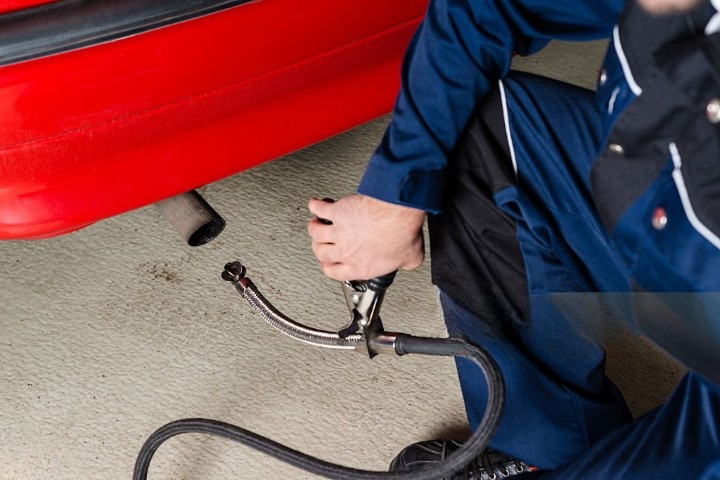In the intricate realm of engine care at Ship Vehicles, where the rhythm of your vehicles health is orchestrated by engine oil flow, striking the right chord becomes nothing short of imperative. Picture this: Regular oil changes, a steadfast...
In the intricate realm of engine care at Ship Vehicles, where the rhythm of your vehicles health is orchestrated by engine oil flow, striking the right chord becomes nothing short of imperative. Picture this: Regular oil changes, a steadfast ritual akin to a melody, ensuring that the heartbeat of your beloved vehiclethe engineremains impeccably harmonized, shielded from the relentless perils of wear and tear. Its a symphony of care; each oil change is a note in a composition aimed at preserving the vitality of your automotive companion.
But what resonates through your vehicles engine when the delicate balance tips and a surplus of oil, an excess, finds its way into the intricate machinery? Our journey embarks on unraveling the signs of overfilling, akin to deciphering the nuances of a musical score and exploring the potential ripples it can cause the dissonance in an otherwise harmonious engine performance.
Amidst the sea of engine components and the delicate dance of excess engine oil, our exploration aims to bring a more human touch to the narrative, much like a musician infuses emotion into a piece. Join us as we navigate the symphony of engine care, unraveling the complexities of too much oil and finding the right cadence for your cars engine.
Signs of Excess Oil
Thick White Smoke
You are identifying the Symptom: Picture thisa discreet warning unveiled through the canvas of white wisps gracefully dancing from your engine.
What unfolds when excess oil, too eager, waltzes into the heated engine parts, manifesting as telltale white wisps? A silent indicator of potential imbalance.
Oil Leak
Noteworthy Sign: Imagine the stage beneath your vehicle adorned with an oil puddlea noteworthy sign, a silent plea for attention.
As you inspect this stage, a meticulous check is in order. Rule out the possibility of loose oil pan gaskets, potential culprits contributing to leaks, with the caution akin to a curator preserving a delicate masterpiece.
In this automotive theater, where engine oil takes center stage, we uncover the nuances through the Yone tone. Join us as we explore the drama of excess oil, weaving a human touch into the narrative of your vehicles signs and whispers.
Consequences of Overfilled Engine
Pressure on the Crankshaft
Imagine thisan intricate dance within your engine, where excessive pressure takes center stage, setting the scene for potential leaks.
Impact on Your Ride: Now, picture the consequencesa potential spillage, a threat looming over your transmission through the silent intrusion of oil contamination. Your ride, once serene, now faces a turbulent melody.
Friction on Crankshaft
Manifestation: A sudden surge in friction, a dissonant note within the symphony of your engines usual hum, all due to insufficient lubrication.
Swift Outcome: Now, feel the outcomea compromised crankshaft, a vital component demanding prompt attention, much like a soloist needing care to continue the performance.
In the narrative of your engines journey, where consequences unfold, the Yone tone lends a touch of humanity, bringing forth the realities of oil pressure, leaks, and the delicate dance within your vehicles heart.
Engine Damage: Consequence Looming
Within the intricate workings of your engine, envision a narrative where inadequate lubrication unfolds as the harbinger of an untimely demise, a foreboding consequence looming.
Unveiling the Risk: As oil pressure escalates, imagine the perila silent intrusion of oil into the exhaust pipe, a menace silently creeping into the combustion chamber, escalating the risk to your engines longevity.
Wet Spark Plug: Observable Clue
We spark drain plug well drowning in the aftermath of excess oil, an observable clue to the unfolding drama within your engine.
Urgency in Action: Now, feel the urgencyan immediate call for action, the replacement of oil-soaked spark plugs, much like a timely intervention in the face of a challenge.
In this chapter of engine tales, where consequences reveal themselves, the Yone tone orchestrates the narrative, bringing forth the humanity behind the potential risks and necessary actions.
You Might Also be Interested In:
Can You Guarantee A Pick Up Or Delivery Date When Shipping A Car?
Diagnosis and Solutions
Checking Oil Level
Procedural Symphony: Imagine the ritualan orchestrated warm-up, a flat surface as the stage, and the dipstick as the cue for a harmonious check.
Optimal Serenade: Picture the perfectionoil dancing gracefully between F (Full) and L (Low) marks, a symphony of balance echoing within your engine.
Correcting Oil Overfill
Gentle Reminder: Now, envision a gentle remindera shedding of excess oil, guiding it beneath the maximum limit, a poetic intervention to restore equilibrium.
Gentle Caution: Picture the cautiona cruise with surplus oil, akin to an accelerando, hastening the engines melodic decay, urging a pause for correction.
Determining the Right Oil Amount
Variations in Crescendo: Hear the variationsthe crescendo of engine oil needs, a symphony played in the key of engine capacity.
Guiding Note: Now, open the melodic scripturethe vehicle manual, guiding with precision, detailing precise oil quantities and manufacturer-recommended notes.
In the symphony of engine care, where diagnosis meets solutions, let the Yone tone guide youa human touch to the procedural, a melody in every solution.
Conclusion
In the delicate cadence of engine care, the query, How long can I run my car with too much oil? Takes center stage. Let the Yone tone resonate as we navigate the nuances of excess oil, steering clear of potential disharmony.
Armed with our expert insights and solutions, youre poised to take the wheel and lead your vehicle through the symphony of engine health. Imagine the regular checks as the orchestral tuning, adherence to optimal oil levels as the conductors guidance, and timely corrections as the crescendo builds to a smoother journey for your vehicle.
In this lyrical avoidance of costly repairs, you become the virtuoso, orchestrating the health of your engine with finesse. The sheet music is clearregular checks, optimal oil levels, and timely correctionsa melodic composition for your vehicles well-being.
As the final note lingers, envision your engine in pristine health, the virtuosity required to keep it in harmony. For every journey, trust Ship Vehicles, your partner, in maintaining the poetic equilibrium of your vehicles heart.
Frequently Ask Questions
Is it OK to drive a car with too much extra oil?
Not. Driving a car with excess oil poses serious risks to your engines health. The added pressure on lubricating engine components, potential damage, and the risk of costly repairs make it imperative to address this issue promptly. If you suspect overfilled oil, its crucial to consult Ship Vehicles for expert guidance. Avoid potential damage and trust the professionals to determine the right action.
Is it bad to run with too much oil?
Yes, running with too much engine oil harms your vehicles well-being. The consequences include increased pressure on engine components, potential friction on the crankshaft, and the creation of air pockets. Such conditions can lead to serious damage, affecting the engines performance. Avoiding running with excess oil or remove excess oil is advised for your cars health and longevity. Please consult us for expert assistance in resolving this issue.
How much oil overfill is ok?
Even a small amount of oil overfill can adversely affect your engine. The optimal oil level is a delicate balance, and exceeding it, even slightly, can lead to increased pressure, potential damage, and costly repairs. Its crucial to adhere to the recommended oil levels specified in your vehicle manual. Consult Ship Vehicles to determine the right amount and avoid potential problems.
What are the symptoms of overfilled oil?
Overfilled oil manifests in various engine oil symptoms, including increased pressure, potential damage to engine components, and the risk of costly repairs. You might notice a burning smell, smoke from the exhaust pipe, or experience issues with the engine light. If you suspect overfilled oil, its essential to address it promptly to prevent further damage. Trust us to diagnose and resolve symptoms associated with overfilled oil, ensuring the health of your engine.
The post How Long Can I Run My Car With Too Much Oil? Expert Insights appeared first on Shipvehicles.com.

















